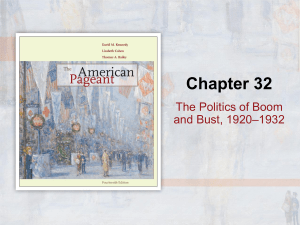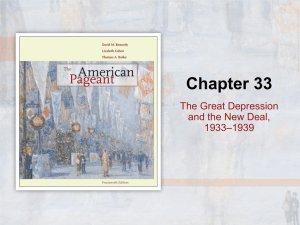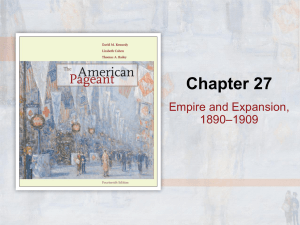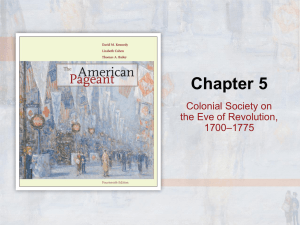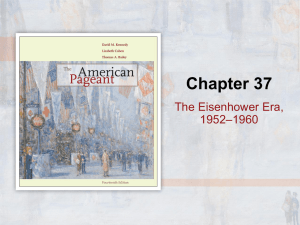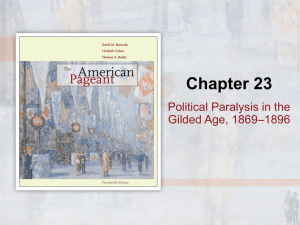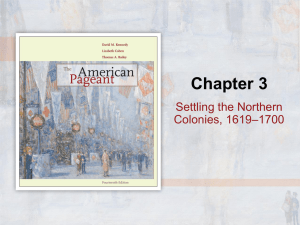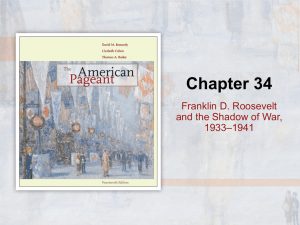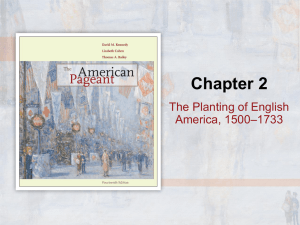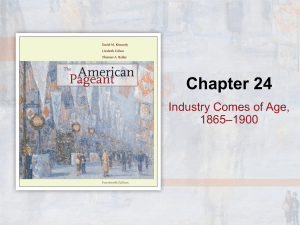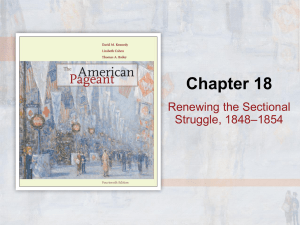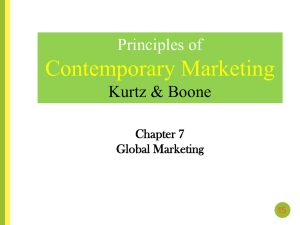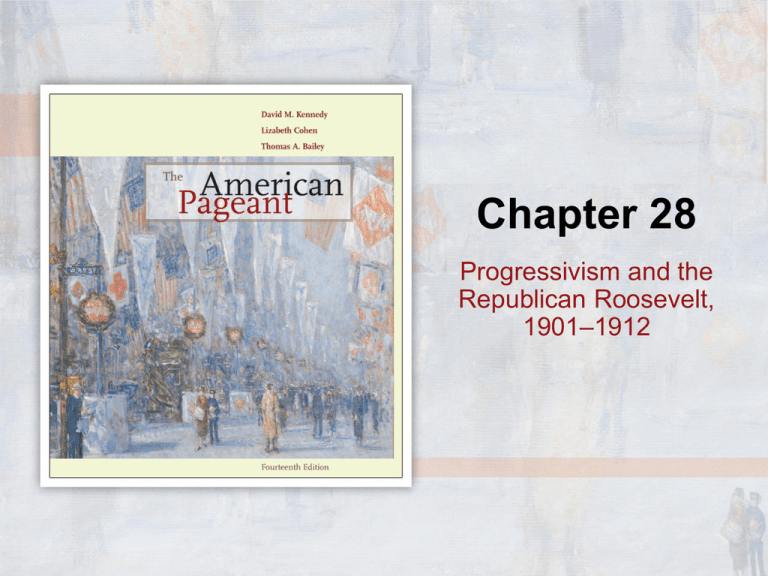
Chapter 28
Progressivism and the
Republican Roosevelt,
1901–1912
Question
The social gospel was
a) a reform movement led by Protestant ministers who used
religious doctrine to demand better housing and living
conditions for urban poor.
b) closely linked to the settlement house movement, which
brought middle-class, Anglo-American service volunteers into
contact with immigrants and working people.
c) heavily supported by the Catholic Church, which had a longstanding tradition of associating with liberal Protestantism.
d) part of a greater societal reform-minded trend of the late
nineteenth and early twentieth centuries.
Copyright © Cengage Learning. All rights reserved.
28 | 2
Answer
The social gospel was
a) a reform movement led by Protestant ministers who used
religious doctrine to demand better housing and living
conditions for urban poor. (correct)
b) closely linked to the settlement house movement, which
brought middle-class, Anglo-American service volunteers into
contact with immigrants and working people.
c) heavily supported by the Catholic Church, which had a longstanding tradition of associating with liberal Protestantism.
d) part of a greater societal reform-minded trend of the late
nineteenth and early twentieth centuries.
Hint: See page 703.
Copyright © Cengage Learning. All rights reserved.
28 | 3
Question
All of the following were true of the Muckrakers
EXCEPT
a) beginning about 1902, the exposing of evil became a
flourishing industry among American publishers.
b) a group of aggressive ten-and fifteen-cent popular
magazines surged to the front.
c) waging fierce circulation wars, magazines dug deep
for the dirt that the public loved to hate.
d) President Roosevelt branded the magazines
“muckrakers” in 1906 because he was impressed by
their exemplary zeal.
Copyright © Cengage Learning. All rights reserved.
28 | 4
Answer
All of the following were true of the Muckrakers
EXCEPT
a) beginning about 1902, the exposing of evil became a
flourishing industry among American publishers.
b) a group of aggressive ten-and fifteen-cent popular
magazines surged to the front.
c) waging fierce circulation wars, magazines dug deep
for the dirt that the public loved to hate.
d) President Roosevelt branded the magazines
“muckrakers” in 1906 because he was impressed by
their exemplary zeal. (correct)
Hint: See page 704.
Copyright © Cengage Learning. All rights reserved.
28 | 5
Question
All of the following were Populist reforms adopted
by the Progressives EXCEPT
a) referendum.
b) initiative.
c) recall.
d) inversion.
Copyright © Cengage Learning. All rights reserved.
28 | 6
Answer
All of the following were Populist reforms adopted
by the Progressives EXCEPT
a) referendum.
b) initiative.
c) recall.
d) inversion. (correct)
Hint: See page 708.
Copyright © Cengage Learning. All rights reserved.
28 | 7
Question
The Australian Ballot was considered a major
Progressive reform because it was
a) transparent.
b) secret.
c) regressive.
d) avante garde.
Copyright © Cengage Learning. All rights reserved.
28 | 8
Answer
The Australian Ballot was considered a major
Progressive reform because it was
a) transparent.
b) secret. (correct)
c) regressive.
d) avante garde.
Hint: See page 709.
Copyright © Cengage Learning. All rights reserved.
28 | 9
Question
All of the following were true of Muller v. Oregon EXCEPT
a) a supervisor in Muller’s Laundry asked an employee to remain
after hours to do an extra load of laundry.
b) the request to a Muller’s Laundry employee to stay after hours
violated Oregon’s law prohibiting women from working more
than ten hours per day.
c) the employee who was asked to stay after hours later
complained to the authorities, and Muller was fined $10.
d) the Court struck down the constitutionality of the Oregon
statute, and Muller never had to cough up his fine.
Copyright © Cengage Learning. All rights reserved.
28 | 10
Answer
All of the following were true of Muller v. Oregon EXCEPT
a) a supervisor in Muller’s Laundry asked an employee to remain
after hours to do an extra load of laundry.
b) the request to a Muller’s Laundry employee to stay after hours
violated Oregon’s law prohibiting women from working more
than ten hours per day.
c) the employee who was asked to stay after hours later
complained to the authorities, and Muller was fined $10.
d) the Court struck down the constitutionality of the Oregon
statute, and Muller never had to cough up his fine. (correct)
Hint: See page 713.
Copyright © Cengage Learning. All rights reserved.
28 | 11
Question
In Lochner v. New York, the Supreme Court
a) invalidated a New York law outlawing unions in the
hat industry.
b) upheld the constitutionality of a New York statute,
which established special protections for women.
c) invalidated a New York law establishing a ten-hour
day for bakers.
d) upheld the constitutionality of a New York statute,
which established special protections for children.
Copyright © Cengage Learning. All rights reserved.
28 | 12
Answer
In Lochner v. New York, the Supreme Court
a) invalidated a New York law outlawing unions in the
hat industry.
b) upheld the constitutionality of a New York statute,
which established special protections for women.
c) invalidated a New York law establishing a ten-hour
day for bakers. (correct)
d) upheld the constitutionality of a New York statute,
which established special protections for children.
Hint: See page 711.
Copyright © Cengage Learning. All rights reserved.
28 | 13
Question
All of the following were true of the Women’s Christian
Temperance Union EXCEPT
a) it was a feisty women’s organization that led the crusade
against liquor during the nineteenth and early twentieth
centuries.
b) it never worked in concert with the mostly male-led Anti-Saloon
League.
c) both the Women’s Christian Temperance Union and the AntiSaloon League perfected the techniques of single-issue,
pressure-group politics.
d) it was the largest organization of women in the world.
Copyright © Cengage Learning. All rights reserved.
28 | 14
Answer
All of the following were true of the Women’s Christian
Temperance Union EXCEPT
a) it was a feisty women’s organization that led the crusade
against liquor during the nineteenth and early twentieth
centuries.
b) it never worked in concert with the mostly male-led Anti-Saloon
League. (correct)
c) both the Women’s Christian Temperance Union and the AntiSaloon League perfected the techniques of single-issue,
pressure-group politics.
d) it was the largest organization of women in the world.
Hint: See page 712.
Copyright © Cengage Learning. All rights reserved.
28 | 15
Question
The Elkins Act regulated the __________ industry.
a) meat packing
b) banks
c) railroad
d) sugar
Copyright © Cengage Learning. All rights reserved.
28 | 16
Answer
The Elkins Act regulated the __________ industry.
a) meat packing
b) banks
c) railroad (correct)
d) sugar
Hint: See page 714.
Copyright © Cengage Learning. All rights reserved.
28 | 17
Question
All of the following were true of the Meat
Inspection Act EXCEPT
a) it decreed that the preparation of meat shipped over
state lines would be subject to federal inspection.
b) it was designed to prevent the adulteration and
mislabeling of foods and pharmaceuticals.
c) the largest packers accepted it as an opportunity to
drive their smaller, fly-by-night competitors out of
business.
d) they could receive the government’s seal of approval
on their exports.
Copyright © Cengage Learning. All rights reserved.
28 | 18
Answer
All of the following were true of the Meat
Inspection Act EXCEPT
a) it decreed that the preparation of meat shipped over
state lines would be subject to federal inspection.
b) it was designed to prevent the adulteration and
mislabeling of foods and pharmaceuticals. (correct)
c) the largest packers accepted it as an opportunity to
drive their smaller, fly-by-night competitors out of
business.
d) they could receive the government’s seal of approval
on their exports.
Hint: See pages 715–716.
Copyright © Cengage Learning. All rights reserved.
28 | 19
Question
The Pure Food and Drug Act of 1906 was
a) passed over President Roosevelt’s veto.
b) enthusiastically supported by the patent
medicine industry.
c) struck down by the Supreme Court.
d) designed to prevent the adulteration and
mislabeling of foods and
pharmaceuticals.
Copyright © Cengage Learning. All rights reserved.
28 | 20
Answer
The Pure Food and Drug Act of 1906 was
a) passed over President Roosevelt’s veto.
b) enthusiastically supported by the patent
medicine industry.
c) struck down by the Supreme Court.
d) designed to prevent the adulteration and
mislabeling of foods and
pharmaceuticals. (correct)
Hint: See page 716.
Copyright © Cengage Learning. All rights reserved.
28 | 21

